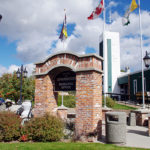Home »

Horgan no Ardern and B.C.’s democracy is weaker than NZ’s
By Anita Nickerson and Joyce Green
Op-Ed Commentary
Three years ago, John Horgan and then-Green leader Andrew Weaver signed a “confidence and supply agreement” that pledged Green support to the minority NDP government until the next fixed election date in 2021, in exchange for serious government consideration of key elements of the Green agenda.
That ended a little over a month ago when Horgan called a snap election.
Why would Horgan break his word, break the fixed election schedule, and hold an early election in a pandemic? Because his support was at an all-time high, and the NDP knew it could win a majority mandate at this moment. It was the opportunity to consolidate NDP power that motivated the snap election and the end to a political agreement with the Greens that was working well for both partners.
Our first past the post (FPTP) electoral system rewards this kind of calculation.
With support of about 45% of B.C. voters (up 5% from 2017), the NDP won 63% of the seats and 100% of the power. With this majority, the NDP doesn’t need to work with anyone else. And that’s not democratic.
New Zealand also just had an election. It too has fixed elections: every three years. This year, despite the Labour government polling at record highs thanks to its handling of COVID-19, NZ’s Prime Minister Jacinda Ardern decided to delay the election to make sure COVID-19 was under control.
When the BC NDP was negotiating the confidence and supply agreement with the BC Greens in 2017, Jacinda Ardern’s Labour Party was similarly negotiating cooperative government with the New Zealand Green Party and the New Zealand First Party. Both jurisdictions were also focused on the emerging COVID- 19 pandemic. Multi-party co-operation was essential in the approach to COVID- 19.
In B.C., the 2020 election featured the usual divisive campaigning. An Angus Reid poll days before the election showed a whopping 48% of voters were voting to stop a party they dislike, rather than to elect a party they supported. Under our FPTP electoral system, votes for anyone other than the winning candidate go to elect no one. They are wasted votes. That’s why many of us hold our noses and vote for the least offensive candidate, not for our most preferred one. It’s also why so many citizens don’t bother to vote.
In New Zealand, under its mixed- member proportional system (MMP), voters could vote for who they truly supported, knowing their votes would all count toward seats for their preferred parties.
In New Zealand’s election, Ardern’s Labour Party was swept back to power in an historic landslide. In B.C., John Horgan’s NDP was also returned in a landslide. B.C. voter turnout was at an historic low, at 52.4%. New Zealand’s voter turnout in this election was 82%.
Around the world, more citizens participate in elections in proportional representation systems.
Ardern doesn’t need to work with the Greens: she has a majority. But Labour is in negotiations with the Green Party right now anyway. Because of proportional representation, NZ politics isn’t a zero-sum game of winners and losers. And Jacinda Ardern knows that working with friends is better than going on a partisan power trip.
If you’d like to replace our antiquated undemocratic and unrepresentative electoral system, send a letter to Jagmeet Singh (send your letter here) and tell him to advocate for Parliament strike a National Citizens’ Assembly on Electoral Reform at once, and make the last federal election our last federal FPTP slugfest between two dominant parties, at the expense of Canadian democracy.
– Anita Nickerson is with Fair Vote Canada; Joyce Green is a Cranbrook resident and faculty member at University of Regina







